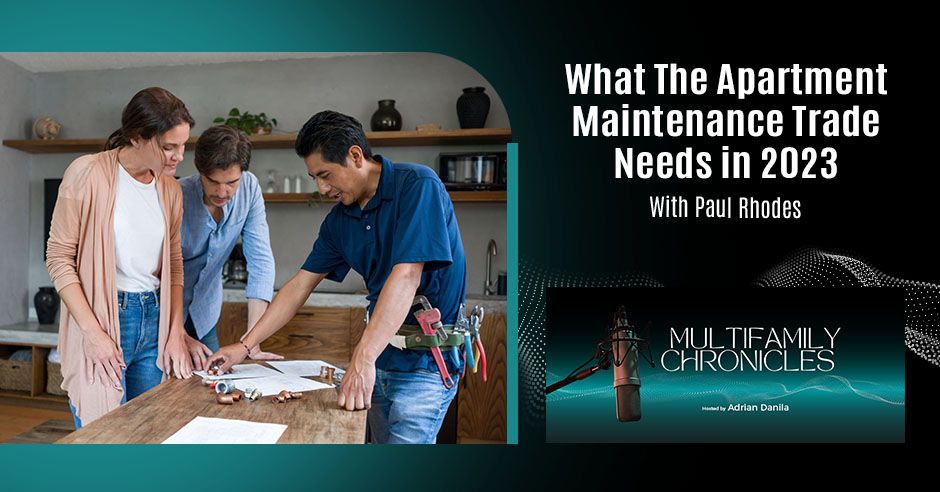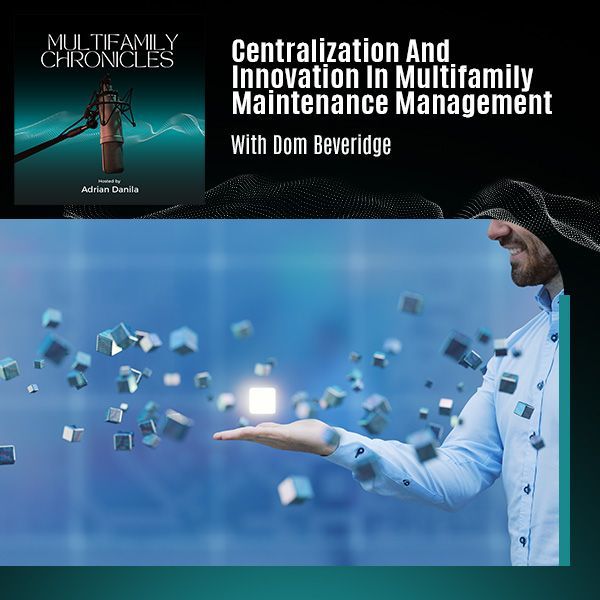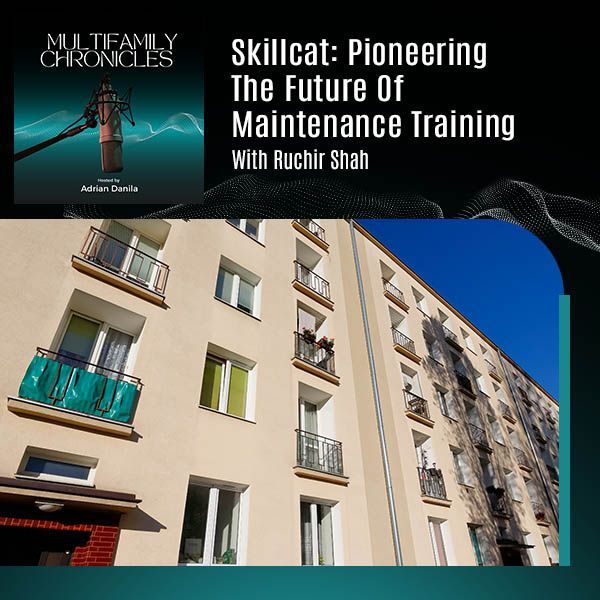What The Apartment Maintenance Trade Needs in 2023 With Paul Rhodes
In today’s episode, apartment maintenance expert Paul Rhodes returns to the show to share valuable insights on the current state of the industry. Paul talks about certifications and what maintenance technicians should have, as well as the current culture of the industry. Paul also gives his suggestions on what needs to change so technicians can best serve their clients’ needs for repairs and maintenance. Join us in this episode as Paul shares his experiences from 28 years of serving in the maintenance industry.
---
Watch the episode here
Listen to the podcast here
What Needs To Change In The Apartment Maintenance Industry With Paul Rhodes
Hello, everybody. Welcome to the show. Our guest is Paul Rhodes. Welcome to the show, Paul.
It’s great to see you again.
Your current position is Senior Manager of Maintenance Learning with Brookfield Multifamily. With that being said, for people that don't know you yet in multifamily, why don't you walk us through your background a little bit, and then tell us a little bit about your current position with Brookfield?
Since we were here, we should talk about the fact that this is part two. For anybody who's not familiar, go back about a couple of screens ago in the YouTube channel. Listen to part one because this is almost a year later. To summarize, I started out in the apartment industry 29 or 30 years ago. Depending on how you look at it, I've spent time in the apartment industry. I started out as a groundskeeper, picking up trash behind properties, and ended up moving through all the different levels at the site level, up until I became a senior maintenance supervisor. At that point, I went to go to work for HD Supply for about six and a half years. I eventually ran their customer training department.
I got an opportunity with the National Apartment Association. For almost a decade, I was their national maintenance training instructor. I traveled around the country and taught maintenance skills and tasks, and the job of maintenance. I also ran the Certified Apartment Maintenance Training curriculum as far as keeping that updated, writing it, and continuing to teach that. World War Germ happened. When World War Germ happened, we could no longer be face-to-face.
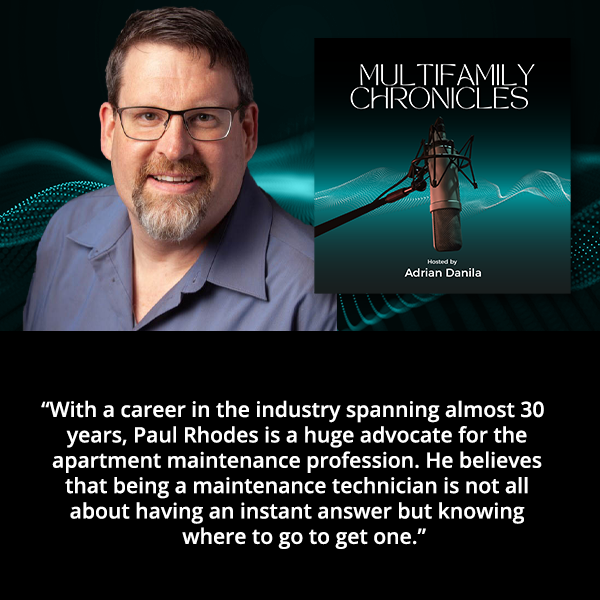
I went to work as the Director of Maintenance for The Life Properties. I worked there for a little over two years and then got an opportunity to join Brookfield Multifamily. We're creating a maintenance learning program. We're making something that I'm not familiar with that is happening with any management company right now. That is applying resources to the process of enlarging the knowledge and skills of very specifically the maintenance workforce.
I joined Brookfield in June. It has been a very short period of time, but we're already moving things ahead. We have some things in planning for the future that is very novel. I think this is a very unique opportunity not only for me personally but also for maintenance technicians that work at Brookfield, and eventually for the industry at large. It's a large endeavor that we're laying foundational work for.
I know that you probably can't share yet some of the details because they are a work in progress. Do you have more details than just the general presentation of this program that you're about to implement out there that you're building that you can share with the audience? If you don't, that's fine.
The details themselves are still being developed. I can't go into there. What's interesting is what we've got happening at Brookfield. One of the reasons why I joined them as an organization is what you reference a lot on your show and postings, and that is the culture that is happening at Brookfield. I'm hopeful that cultural mindset expands beyond Brookfield because quite selfishly, it's the best I've ever seen. It's fantastic. I love being at Brookfield. What we have going on there is very exciting, and it is neat.
That goes to where we end up picking up from our conversation before. In the last session, you asked me a question about culture, and I backed it up one level and never ended up answering your question. The exciting thing about Brookfield and why I made the change wasn't for money, title, or any of the other things. It was truly a cultural shift and not going from a bad one to a good one. It’s going from a culture that I agreed with to another culture that is much more exciting and in line with what my goals are and what I want to do.
Before we get into culture, discuss everything from a culture standpoint. I speak about culture. I write about it a lot, and I'm very passionate about it. Before we get to that, you have trained thousands of people. You've been in front of thousands of people. I want to bring up a couple of specific topics in the conversation. The first topic is most companies on the management side and executive side are looking to hire certified techs. By certified techs, they mean someone that has the EPA card that allows them to handle refrigerants according to the law. They are thinking in their mind that when you hire someone that's certified and has that EPA card, they know how to troubleshoot and fix HVACs.
The reality is they couldn't be more wrong about it. That's only the beginning piece of being allowed to be next to a unit, use the refrigerator, and charge it out. Charging a unit is not just a smaller piece. It's a very tiny piece of everything HVAC. It's probably one of the less things to worry about when you're looking at the system. The reality is because this misconception has been perpetuated over the years, technicians embraced it. Even residents embraced it.
We will have service requests that are saying, "My AC is not cooling. It needs Freon." I would like for you to touch on this misconception. First of all, address it. Second of all, in your opinion, how long do you think it takes for someone that has very little knowledge or they're very basic with maintenance skills to become a skilled and well-rounded maintenance technician that could do over average work in all those areas like HVAC, electrical, plumbing, carpentry, so on and so forth.
Let's start with the second part of your conversation first. That is such a challenging question to answer because in our industry, being an apartment maintenance technician, there are very few industry-accepted standards. Think about a car mechanic. In order to become a car mechanic, you have to get the ASME certification. That is an industry-wide certification. In the mechanics' world, everybody knows what that means. In order to do that and get that certification, it's my understanding that not only is it a written test, but it's a practical test. In other words, you have to prove repeatedly and through multiple examples that you know how to remove the right lug nut and put it back on. That is an understood credential and certification both inside and outside the industry.
Being an apartment maintenance technician is a challenging thing because, on the whole, this job that you and Russ Webb were talking about in your recent episode is a non-intentional career, especially on the maintenance side of the house. We fall into this. I fell into the industry. You have said you fell in. A lot of people on your show have talked about the fact that they didn't set out in life saying, "I'm going to be an apartment maintenance guy." We fell in.
It's like that big hole that once you fall in you, it's hard to climb out. Eventually, when and if you do decide to climb out, you look back and say, "It wasn't so bad,” so we go back. That's what happened to me. I went and spent a year as a swimming pool contractor. I built and remodeled swimming pools. After twelve months, I looked back and said, “I liked it.” I came back into the industry and got involved.
I've been dancing around it but truly, I think that it takes probably 2 or 3 years of somebody who's very intentional at being an apartment maintenance technician to become a proficient maintenance technician. Malcolm Gladwell in his book says, "If you do anything for 10,000 hours, you become an expert." Ten thousand hours at 40 hours a week of being in maintenance works out to over five years or so.
It takes two to three years of intentional work to become a proficient apartment maintenance technician.
If you work 40 hours a week, it's 2,080 hours a year.
It's right at five years or a little bit under five years. Taking that as an example, it’s five years to become an expert as an apartment maintenance technician, supervisor, and worker. The challenge there though is you only become an expert if you've been at one property for five years. You only become an expert at those systems as an intentional person, and not just studying this Carrier, Rheem, Goodman units, or the MOEN faucet, or this particular GFCI.
If I'm working on an air conditioning system, I have to be intentional and say, "The Goodman unit that I'm working on has a service valve with a couple of O-rings on the inside of it. If I go and install it, and then I remove those O-rings and I braze it in fast enough, I don't melt those O-rings. I can reuse it, lock it down or tap it off, and do all of the things that the Goodman unit was designed for." I have to be intentional and go beyond that. Goodman uses that style valve. What about Trane? Trane uses a different style valve. As a matter of fact, the Trane unit uses the roto-lock connections at the compressor.
If I have only worked on one property or one type of system for five years and I become an expert on that system, that's great. If I can't transfer that knowledge to another property, that's where the challenge becomes. As an industry as a whole, the part that we're lacking is where that mechanic's analogy comes into play. In order to get that ASME certification, you have to know not only how to work on a Toyota, Ford, Chevy, or whatever other brands, but you also have to know the commonalities of all of them and when to get specific on the individual brand that you're working on.
As apartment maintenance technicians, we have to do the same thing. We have to understand the 3 or 4 different types of valves that are found in faucets. No matter which one I'm working on right now, I need to have a baseline of knowledge. I can go to the individual faucet and know the troubleshooting path or the steps to fix that, more than, “I've only worked with Delta valve faucets.” Once I get outside of the Delta ball valve faucet, if you put me in front of a MOEN, which is a cartridge faucet, there are some things to transfer, but there are some other things that if you try and fix a MOEN the way that you took apart the Delta, it's never going to happen.
To answer your question, I think that maintenance technician needs to be involved and intentional about their work for 2 to 3 years to get a sense of what's going on. To be an expert, I would say five years. That is five years of multi-site experience. They've been exposed to more than just one type of faucet, one type of system, and one type of building. That was the second part of your question. The first part of your question was about the certification issue. This is a huge one. In Georgia, Florida, Texas, Mississippi, and all across the south, air conditioning is such a huge issue. That EPA certification carries a lot of weight because when the air conditioner goes down, that's it. The residents are affected big time.
Suddenly, everybody has a medical issue and the air conditioner has to be fixed right now. It is an important issue. I know in my own home that if I come home and my wife meets me at the door and says, "Honey, I'm hot," my answer better not be, "Yes, you are." It needs to be something along the lines of, "What do you mean you're hot?" “The air conditioner is broken,” and I better have an answer for it. Otherwise, I'm sleeping in the doghouse.
Air conditioning, especially down south, is absolutely essential. One thing that's missing though that seems to be overlooked quite a bit is this. Proper air conditioning is essential not only for resident comfort but also for the longevity of our buildings. Air conditioning removes moisture. Moisture in the air can lead to that four-letter word that you and I both know that none of our management companies have because we've outlawed the use of that four-letter word.
One of the primary things we have to do is get rid of the moisture in the air, which is what the air conditioning system does. That means we got to have proper running air conditioning systems. The biggest mistake leads to exactly what you questioned. There is a huge impetus or importance on air conditioning repairs.
One of the nationally recognized certifications or arguably, it's the only federally recognized certification that the apartment industry has, is the EPA Section 608 certification. That is the refrigerant reclamation certification that was put into place from the Montreal Protocol. It was updated in 2018 to be a new test that is rolled out and is constant. It is a nationally recognized certification but the common misunderstanding is exactly what you stated. Just because somebody is certified does not mean they know how to do anything. The reason why that's an important fact is the certification was never designed to prove proficiency. It wasn't designed that way.
The Environmental Protection Agency intentionally states that it is purely an administrative certification. It was enforced back in 1993 and when it was updated, they continued it. You get the book from any supplier. You memorize the book, and then you take a hundred-question test, and you're certified. You don't even have to be able to point out the difference between a condenser and an evaporator physically. If you memorize it, you've got the test. It’s not only that. Trade schools, HVAC contractors, and manufacturers all across the board regularly state that 85% of all equipment failures are not related to refrigerants.
Let me say that again. The overwhelming majority of work orders do not require refrigerant to make the repair. You mentioned earlier that technicians have gone along with this saying that certification is this big important thing. I know from talking to technicians at conferences all around the country, management companies actually give a raise for achieving that certification. I'm not saying that's a bad thing because it is a verifiable achievement. It is a level to get there. In the process of creating this overvalue on the certification, we somehow lost the fact that the majority of the time, the physical skills required to solve a resident problem with air conditioning don't have anything to do with the need for that certification to occur.
Overwhelmingly, it's airflow issues, electrical issues, and mechanical issues. I also got to have these cool neat gadgets, gizmos, and tools that I get to use every once in a while to fix the refrigerant side of a system. When I would go to properties onsite, I would get a manager saying, "I need to hire somebody certified." My response is, "You don't need to hire somebody certified." Getting somebody who's certified is easy. I can pick anybody off the street. If they can memorize that book, they can get certified without ever seeing anything to go. Not only that, if all we're hiring a maintenance technician to do is throw some Freon into a system, I've already lost.
If all our technicians are doing is throwing Freon or refrigerant into a system, we are shortening the life drastically of that system. Unfortunately, it's not only the apartment industry that is suffering this way. It is the air conditioning industry at large. Case in point, a few years ago, I had the system at my house replaced. I called a contractor in. I wanted them to do it because I wanted the full ten-year manufacturer warranty on my system. A part of that came with a one-year free inspection service where every six months, the installation company that came out would check my system, verify it, and do a little bit of preventive maintenance. It’s mainly just to verify that the way things are supposed to work is what they're doing.
The technician they sent out who was not the installer came and looked. He went out to the outside unit, checked that, and then came inside and began looking for the indoor capacitor on an ECM motor. For those in the audience that is not familiar with an ECM motor or electronically commutated motor, it does not have a capacitor. If you're familiar with this as a service technician, if you pull a cover off, you can identify it just by looking at the motor. You don't even have to dig or anything. All of a sudden, this guy pulled the cover off, looked at the motor, grabbed his wire cutters, and began to remove all the zip ties that had the wire bundles together all nice and neat.
I stopped him and said, "What are you doing?" He said, "I need to test the capacitor." I said, "You can just get out." He said, "What do you mean?" I explained to him the motor doesn't have it. What struck me is here's a guy that's on a truck with a reputable service company. They did a great job installing the system, but this guy is their technician. He's the guy they send out to people who have this system. He's supposed to verify it’s working, and it's obvious he doesn't even know it's working. He's a certified technician. My guess is he is there because he's got that EPA certification. He was hired to run the truck.
In my mind, that is very basic information. The point of this story is that if we as employers and leaders in an industry that are relying on people to provide service to our residents, we need to have an idea of what service we need them to provide and be able to prioritize that, not a piece of paper or the ability to answer a test question. We need them to know what it is that we need them to know. As leaders, we've got to have an idea of what's behind that. It was so exciting.
I watched this morning the episode you recorded with Russ Webb down there in Florida. It was exciting to me the fact that they've taken their office space. If I understood it correctly, they took their office space and turned it into a maintenance training space. That's brilliant. That's phenomenally awesome. Russ is a great guy. I remember being a part of and doing some training at the facility that he created up here in Atlanta before he went to Florida, and wow. It's so exciting to see what he's got going on.
What recommendations would you have for someone that's in a multifamily or maybe in the maintenance field as far as resources like books and things to improve themselves? What are some good materials that you would recommend to someone who is intentional about their career? They want to become better. They don't just wait for a company to provide them with the resources. They could go out there and look for those resources themselves. Let's make it easier and make it available for them. Could you think of some great literature and books that you would like to share with the audience?
The answer to that is a challenging one from a stereotype that apartment maintenance technicians typically are not looking for those resources right now. I think that's got to change. It may be a little bit of a chicken-and-egg scenario. There are so very few resources specific to the apartment maintenance industry. That list will be very short. The bigger issue is the fact that we've got to change the discussion a little bit. Being a maintenance technician does not mean that you have to know everything right now instantly just like that. Some of that is how we've treated our residents, especially during World War Germ.
To be a good maintenance technician, you don’t need an instant answer to every problem right away.
We got to the point where we actually incentivized our maintenance teams to spend as little amount of time with our residents as possible. For understandable reasons, we wanted to shorten that interaction time. This feeds into that culture thing, but as unintended consequences, we took away the need for our maintenance technicians to figure things out. In other words, I go into a residential apartment and the dishwasher is broken. In order for me to diagnose that dishwasher, under normal terms and circumstances, I would need to pull the dishwasher out. I would need to maybe flip it upside down, take out my meter, and move and interact. I would take up a lot of space in that kitchen for a period of time, whatever that is.
As a whole and as a country, we essentially told our maintenance technicians, "I want you in and out of there as fast as possible.” That is if the resident calls us at all because we told them not to call. When they do call, “If you go in there, I want you in there in as shorter period of time as possible,” for all of the various reasons. The unintended consequence was the maintenance guy or gal would end up going in there, taking one look at it, and turning it on. If the answer was not completely and totally obvious, they replace the dishwasher because replacing the dishwasher is faster and less interaction than actually troubleshooting.
We went through a time period of a year and a half or two years where we decreased the need to troubleshoot and we increased the need to order, organize, and schedule. Those needs are still there, and they have always been there. The end result is now we're in an environment where our residents expect troubleshooting to happen just like that. Not only that, the overwhelming of our residents on larger properties expect that if I call you with a problem, just replace it, don't fix it. That is unfortunately what we have created or has been created due to circumstances. Now, we're getting back to it.
The first thing I would say on resources available for maintenance technicians is to be sure that our maintenance technicians know it's okay to not have an instant answer. A caveat to that is it's okay to not have an instant answer as long as we know where to go to get an answer. That's the part where your question comes into play. What resources are available? The first one that I use quite a bit of afternoon reading is Troubleshooting and Repairing Major Appliances. It's a good resource. It is available as an eBook. That way, you don't have to carry this thing around. I've got it downloaded on my phone in a reading app so that I can use it as a reference. It has got some good troubleshooting guides.

On a larger picture of the apartment industry, I use and reference a multifamily housing industry textbook. This was helped put together by someone you and I know very well, Dr. Debbie Phillips. She was instrumental in getting this tone set. It is the business of multifamily in the apartment industry. As a good reference for heating and air conditioning, any resource by HVAC Excellence, which is part of ESCO press. Any of their resources or books on heating and air conditioning is a fantastic reference that they end up having.
I think it's crystal clear, all of these are references. In other words, even the appliance book that I said was a little bit of light reading, it's a reference. In other words, it's not a book I'm going to sit down and read cover to cover. Books like that require a little bit more imagination or creativity on how to apply knowledge from one area to another. A good book that I've read that completely changed my mind in a lot of areas is a book called Think Like a Rocket Scientist by Ozan Varol. It's a fantastic book. A lot of it applies to being a maintenance technician without talking about being a maintenance technician.
It's problem-solving, troubleshooting, and being creative or thinking outside of the individual box. The other big one that has changed the way I look at my job as a leader is a book by Brené Brown called Dare to Lead. You talked about in previous episodes the need for training or development for our maintenance teams in the skill of how to be a leader. When I was with NAA, we created an online module called CAMT+L, which is the plus leadership credential. I honestly don't know how successful it has been or is. I know that there is very little discussion or little marketing towards that for our maintenance technicians.
I would love to see that bigger, partially from a selfish standpoint. I helped create it and I want to make sure that other people know of it, but even bigger from an industry standpoint. You've said it on your show in previous episodes. We have a challenge in that the median age for being an apartment maintenance technician is getting older mainly because we are not getting a lot of younger people involved. I don't have a solution for it, but the end result is we've got to develop the people that do join our industry in more than just how to fix things. That's a part of it. We got to have that ability to fix things, but we also have to develop leaders.
Develop leaders and also teach people and managers how to manage. I don't want to shy away from saying that we need managers. Of course, we need leaders. We desperately need managers. Personally, the way I see management from leadership, management is the intermediary thing into getting to become a leader somehow. You could be a leader without having a title of a manager. At the same time, you might not have the title, but if you don't have those traits that are making you eventually a leader, then you can't manage. In other words for me, it's a two-step process. There's no shame in saying that we badly need managers. We especially need service managers.
This brings me to the next topic, which is service managers. Let's talk about how can someone become a service manager. It's a team of 2 or 3. They're the highest-producing maintenance technician out there. They're producing the largest amount of problem-solving or service requests. If something happens to the service manager, they move on, leave the industry, get fired, or whatever happens to them, you are the next in line because you're the highest-producing maintenance technician. They’re shaking your hand, “Here are the keys. Congratulations. From now on, you're going to co-manage a $60 million, $70 million, or $80 million asset. Good luck to you.” How crazy is that?
You're asking the right question in there. In tradition, it’s the same thing I did the first time. Let's back up one layer behind your question. I completely agree with you. That's a point, but we also need to back up one level above that. If we say we need more service managers, do we actually know what the solution to the problem is? Have we defined the problem? When you say we need a service manager or someone who's going to co-manage, do we have a culture around them that knows what it means to co-manage? That right there is the crux.
When I was with Life Properties, and I've also run into it a few times with Brookfield, you have a service manager or maintenance supervisor, whatever the title says. They're in that role. In private moments when you talk with them and get past whatever barrier is in place to where you get to that point of vulnerability and honesty, and you ask them, “How are you doing? How are you doing your job?” Their reply is, “I think so” or “I would love to go back to being a technician.” In those moments, that I think is a problem. Before we get to the point of solving it, we have to define what that role is. You said we need managers. I completely agree with you. What are we having them manage?
I left on-site in 2005. When I was on-site, the way the properties I was at was run, and throughout my career of observation now that I'm out of on-site and I get to be that independent third-party eye that goes on, my belief and my experience tells me that the best-run properties are exactly what I believe you're implying or that co-management. I tend to think of it in terms of traditional marriage. You got a husband and a wife, and they both are in it together. Both of them are providing 100%, and yet in the traditional marriage, you've got one with the right of veto who carries all the responsibility. I tend to look at property management at the site level as having that same relationship.
If we're saying we need more maintenance supervisors or someone to lead the maintenance team, are we saying we need to develop people to be that co-manager that understands they have a stake? The manager that leads the office or the operations of the properties, they have a stake, and they both are working together. I know you've heard it because you've been to conferences and around that, a lot of maintenance technicians, supervisors, and teams get frustrated by the amount of micromanagement that happens on-site. When I was teaching around at conferences and doing sessions, that was the number one complaint. They just micromanage. That's a fact. Let's define it.
Why are they micromanaging? Why is our office micromanaging? I fundamentally believe, and my experience tells me they're micromanaging because they are held responsible for their output, product, and what they produce. In this case, profits, meeting budget, hours, overtime, whatever the metric is that they're going for, that property manager is held responsible for that. No one else on the team has an understanding of what that means. For whatever reason, they micromanage, which I think that term is ill-defined anyway.
They get overly involved in the maintenance side of the house because, for whatever reason, the maintenance side of the house, that manager and property leader do not have the trust that they can go to their maintenance team and say, "I need these five apartments ready in seven days." Even better, they can go and have a conversation with the maintenance side of the house and says that the maintenance side already knows that there are five apartments coming available that we need to have to happen. As an industry, are we developing our maintenance teams to know how to read the availability a month ahead of time?
One of the biggest frustration points for me, and this goes and speaks directly to it, is we are not developing our maintenance technicians to the point of pulling that availability once a week, and looking not for today's work and not for next week's work, but next month's work. The majority of leases are on at least a 45-day notice to vacate. That means that 45 days, a month and a half ahead of time, we already know who's moving out. If that's true, then that means we know that next month, I need to turn ten apartments. To oversimplify it, that means if I'm turning ten apartments, I need to order 40 drip pans and ten toilet seats. Insert whatever we need to order here.
We are not teaching those very basic skills, and then extrapolating them out from there all of those other skills. Here's the point, and this gets back to answering the original question. How do we train maintenance supervisors or leaders of the maintenance team? The first thing we have to do is be sure that we have a culture of importance. Everybody has an understanding on paper of what their role entails, and then what their role actually is at that job. Just because your job description says you do A, B, C, 1, 2, 3, you and I both know, Adrian, that job description got me hired. That's where I started, but if only do A, B, C, 1, 2, 3, that A, B, C, 1, 2, 3 was oftentimes written or put compiled six months ago.
The industry has changed, especially now. A, B, C, 1, 2, 3 could be that number 2 and C we're not even doing on our properties anymore because we've already changed technologies. We don't need that anymore. We need to get to the point where our culture is such a thing that everybody knows what their priorities are, how they interface with the places they reach and touch up against, and everybody's moving towards that same goal and vision. That's truly how I think we need to answer the question of how we develop maintenance supervisors. We have to make sure that we identify what that role means and what the reporting structure looks like.
We need to get to a point in our culture where everybody knows their priorities and everyone is moving towards the same goal.
I couldn't articulate it better. Thank you for doing it. This brings me back to the next episode's topic, which is culture.
I'm going to ask you a question. I'll put you a little bit on the spot here, Adrian. When you say culture, and we say it an awful lot. We say we hire for culture and it is a good thing. What is your definition of culture?
To me, culture is the sum of all the employees' behaviors in an organization. Everything that you see exhibiting as a behavior from all of the employees, from the very entry-level person to the CEO or president of the company combined, is what your culture is, day in and day out. Behaviors exhibited behaviors. The way you influence a culture is you reward the type of culture that you want to have. In other words, you reward the type of behavior that you know you wanted to see more of, and then you look for ways to minimize the type of behaviors that you don't want to see in a workplace. What is your definition of culture? What do you think about my definition?
I like it. I agree with you to the point that your definition of culture is on the output side. This is what we're producing and this is what we want to reproduce, and we're going to hold accountable to this level. In other words, at some point, your definition of culture is we define it with a metric. It's measurable and set. Everything above that, we want to entice or drive. That's what we want. Everything below that, we want to stay away from. At some point, there's an accountability that goes in there. I can't disagree with what you said and how that's there.

My definition of culture is a little bit different. My definition of culture is the feeling that surrounds the way that decisions are made within an organization. Here's the big case endpoint. I've been doing a lot of studies here lately preparing for Apartmentalize 2023, which is in Georgia. I'm hopeful that I get to speak there again because I still love the National Apartment Association, and that event is a huge networking event. I hope that more maintenance people attend, which is where my point comes into play.
I know you've heard it and may even have been a part of some organizations or various things where management companies say, “We value our maintenance workers. They are essential. We value our maintenance teams.”That's a great thing to say. Does your decision-making process reflect the truth of that statement? According to the National Apartment Association’s own data, attendance at Apartmentalize is 5 to 1. Meaning, every single maintenance worker across the board of all levels, technician, supervisor, regional, or corporate, for every single person who identifies as a maintenance worker for the National Apartment Association at Apartmentalize, there are five times as many property managers. That’s one role. Five times the amount of property managers attend Apartmentalize for every single maintenance work as a whole.
Here's the crux, and the reason why I bring that up. If your organization says, “We value our maintenance workers,” and yet it's a 5 to 1 difference within your organization on the amount of development that is being offered, what does the feeling go to your maintenance workers on how much they are actually valued? In the conversation you've had with Russ Webb, she brought up a very dear friend of mine by the name of Mary Gwyn. Her organization, Apartment Dynamics, every year now, they make a point of taking maintenance supervisors and maintenance workers to conferences and national events.
I know that's just a microcosm. That is a small example, but that is an example of decision-making that reinforces the fact. If we're going to have a discussion on culture, how do we change the way decisions are made so that we get to the point where our maintenance workers who are already on our property know, without a shadow of a doubt, that actions match what they're feeling? At that point, that's where the culture changes.
That’s a big deal. Walk the talk. That's another component. I'm going to ask, would you come back to do an episode just on culture alone? How do we see certain things and how do we see parts of the business, especially the maintenance that you and I are coming from mainly, how does that affect the training, on-call, recruiting, and teamwork? How does that affect and impact our maintenance teams? I think there's so much value and better understanding to people in hearing from someone like you. For the most part, it's a matter of taking the time to understand the effects of culture on our maintenance teams.
When I wrote about it, I said, "If you want to know how much maintenance is appreciated in a company, look at the corporate level, and compare how many people you have oversight in maintenance versus management.” In my opinion, if you value them and they're the backbone of your business, it has to be one-on-one. It doesn't have to be the regional maintenance director. It could be a floater or someone at a corporate level or part of the support team for maintenance.
The parity should be one for one, one regional manager or assistant regional or admin person that supports the maintenance teams on the operation side, and one maintenance person. It could be a challenge. It could be considered. It's subjective. If you value as a company your structure and culture, and you know your maintenance teams, probably you should be seeing the closer you get to that ratio, one for one, the more weight your statement has. Do you disagree?
I can agree with that. I never thought about it in those terms. I would love to ponder that more. The one thing that comes to mind though is if that is a goal that expands that career path, as an industry, we are very challenged all around. I don't think that as an industry, we do a good enough job of creating and promoting a career path not just for maintenance. You and I are very discriminatory on the maintenance side of things because we need more maintenance. We've got to have more maintenance.
If we take a step back, the reality is I'm not sure there's that good of a career path on that leasing or office side either. I'm honestly not sure in the same way that being a good maintenance technician truly does not create the skills necessary to be a good maintenance supervisor. There are some parts that you got to know. It's a stepping stone. We don't have a career pathway or a learning pathway in a lot of examples to bridge that gap. In the same way, I don't think that the skills of being a good leasing agent lead to being a good assistant manager, or I don't think the skills of being a good assistant manager lead to being a property manager. Somebody like my good friend Vicki Sharp, who's a speaker, talks about this quite a bit. That career path is a challenging one to make.
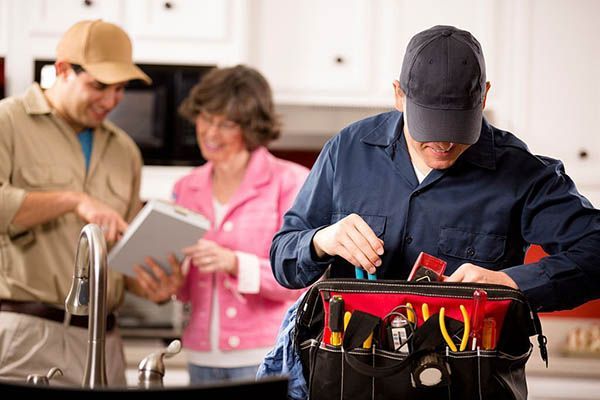
Leah Brewer has also talked about this in conferences and seeing her things. I agree with that. One of the areas that we are challenged at and one of the big opportunities we have is creating that career path, not only as an industry but down to our property level as well, to market or get across that message that if you are a maintenance technician, if you learn skill A, B, C, 1, 2, 3, then you set yourself in a position to move up to that next role or title when it comes available. The reality is we need more apartment and rental properties. Those positions are coming available.
It goes back to something I said during the first episode. Being an apartment maintenance technician, there is a lot of job security to go around. Especially for those in the audience who unfortunately are being downsized in those tech jobs and what's going on with all of the social media areas that are laying off the thousands of people, come and be apartment maintenance technicians.
You don't have to punch a keyboard all day. As a matter of fact, it's great. You get to run around outside. When the weather is bad, you got to outside, but you get to work with your hands. When you're finished, you get to see the results, and you directly affect somebody's life. You are that superhero that you get to be. Being an apartment maintenance technician is the best job and the best role.
Paul, it seems like the more we talk, the more things we haven't touched on. We're just opening a whole box of cans of worms, which is a great thing. I would love to have you back on to continue the conversation and to do more episodes because your perspective is very fascinating, useful, and needed. Voices like yours are needed to be heard on a regular basis. Why am I saying that? Conferences are great. I'm trying to attend them. I had a couple of opportunities to speak myself too, but they only capture the current audience, 50, 100, or 500 people at a time.
Conversations like this could be put out on the internet and they're living there forever. Your input on so many important topics in the industry lives there forever. It's not something that is going to change overnight. Some of the topics are going to still be relevant 5, 10, or 12 months from now, maybe 2, 3, and 5 years. I would love to have you back here. Maybe in the next episode, we'll make it exclusive to culture. We're making a point to stay on the culture and just discuss culture, and how it affects all the faces of our maintenance. Are you in for it?
I’m in for it. I'll even put two challenges there for your audience. As a trainer and an educator, you can't just go with what's there. There has to be an application beyond. Here's the question. If you're there, think for a moment about your culture, the feelings surrounding the way the decisions are made at your property, or to Adrian's point, the output or what you're producing, good, bad, or otherwise.
Here are two questions to think about. First, what does that 2:30 AM emergency waterline break look like for your maintenance technician? It’s not how they fix it, but what’s the thought process for your maintenance guy at 2:30 in the morning? The thought process is what we're looking for because that is where culture meets the rope. Those decisions that are made right then and there, and the culture that has been defined beforehand in the middle of that crisis are where the culture meets reality.
Secondarily and possibly even more important but harder to answer is this. At 10:00 in the middle of October, summer is done and winter isn't here yet. There's a lot of work to do, but nothing is yelling and screaming having to be done. What does it look like for your maintenance supervisor and leader of your maintenance team at your property in that moment of, “I've got a lot of things to do. How do I decide what is the priority?”
That decision process is where the culture shows. That’s where you're driving the good things and diminishing the bad things. Those are the two points. That’s the homework between now and the next time we come together. One, in the middle of the night urgency, what is the decision process for your maintenance technician? Second thing, on a normal everyday, what does it look like? How do they determine priorities? Whenever you're ready. You could tell I'm shy and bashful. It will be hard to come out of my shell.
Those are excellent segues to get into the next step episode. I'll love to have you back here within the next few weeks to record. We don't have to wait another eleven months. I can't even believe it. It's such a shame that it has been almost a year, and we discussed that we're going to have another one soon. Paul, I can't thank you enough. It has been an amazing conversation and insight. It's always a pleasure to have you here and have a conversation with you. I'm sure that the audience will learn a lot from this content and your wisdom.
I'm still trying to figure it out myself. That's fun. That's what makes it enjoyable.
Paul Rhodes is our guest. We both thank you for tuning in. I hope to see you back here soon. Have a great day.
Important Links
- Paul Rhodes
- Brookfield Multifamily
- Russ Webb - past episode on YouTube
- Think Like a Rocket Scientist
- Dare to Lead
- Troubleshooting and Repairing Major Appliances
- HVAC Excellence
About Paul Rhodes



